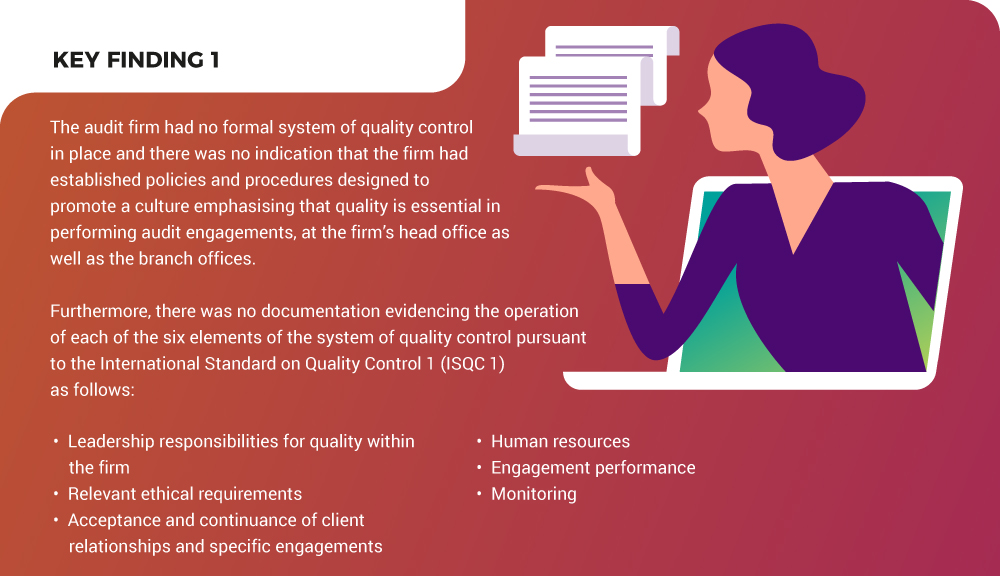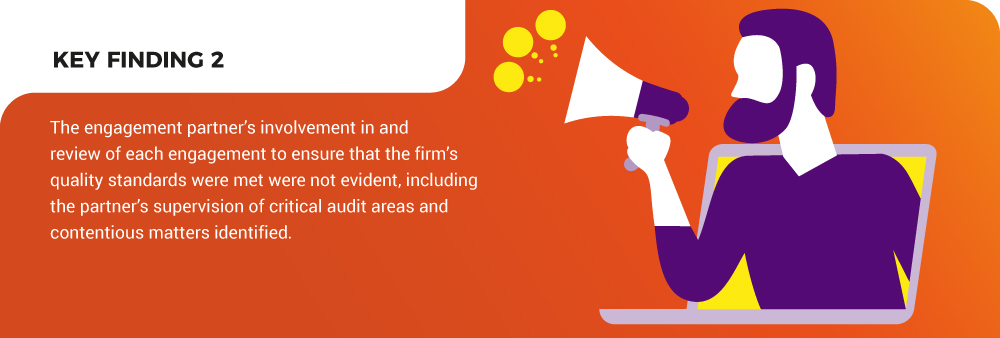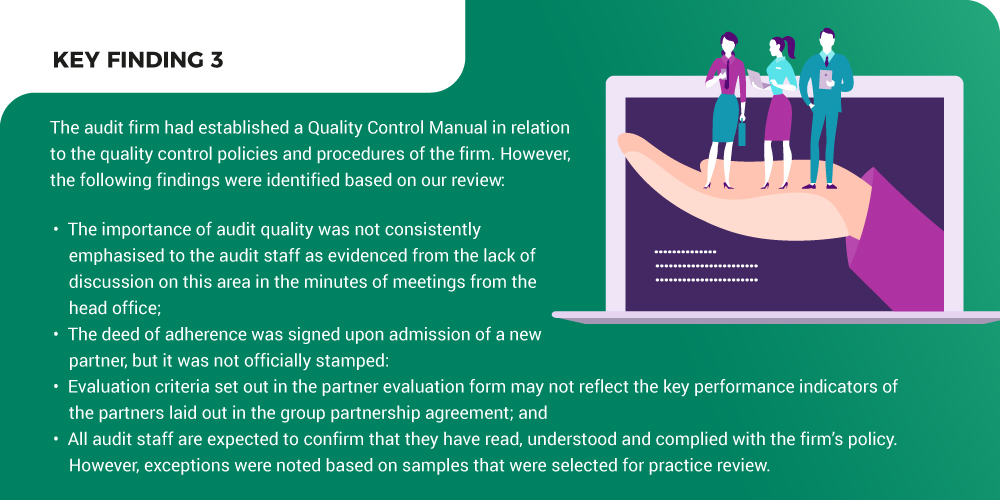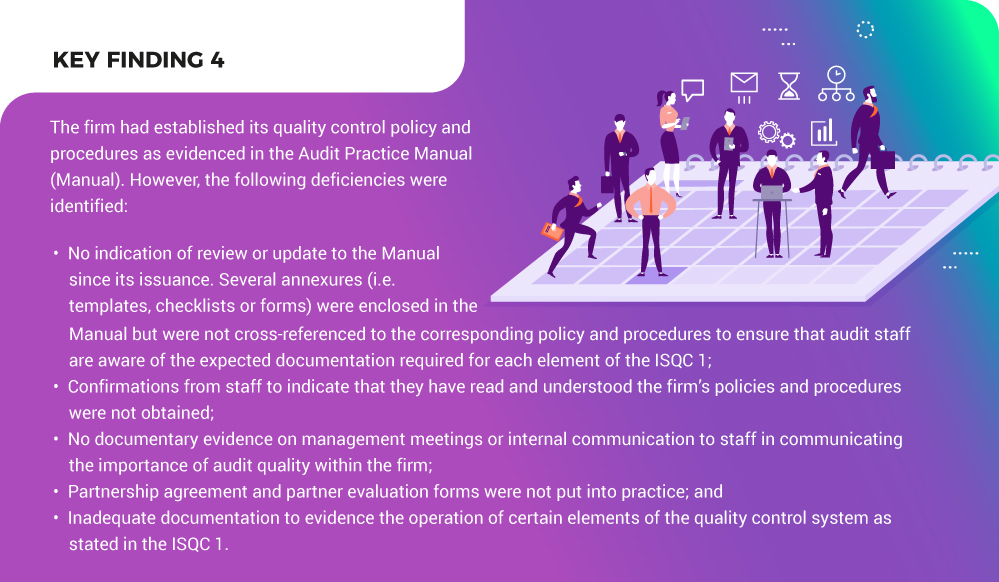“Leadership Responsibilities for Quality within the Audit Firm” represents the first element for system of quality control as prescribed in the International Standard on Quality Control 1 (ISQC 1). Indeed, the leadership of an audit firm constitutes one of the key factors affecting the audit quality of the firm; a leadership with strong commitment to improving and maintaining quality control results in the firm achieving quality in the audit engagements conducted. It is the responsibility of the leaders of the audit firm to promote a quality-oriented work culture where commercial considerations do not override the quality of work performed and to assume ultimate responsibility for the firm’s quality control system, as the auditor’s integrity will be compromised if commercialisation is prioritised over professionalism in the audit work.
This article intends to provide additional awareness to our members specifically for this element of ISQC 1 – Leadership Responsibility for Quality, via the findings of practice review observed from 1 July 2020 to 31 December 2020. The findings shared from the Practice Review Department (PRD) have significant educational content and are beneficial to practitioners. They serve to guide practitioners in training their staff and alerting them to many pitfalls that may derail them in the course of carrying out their work according to the policies and procedures of the firm.




Recommendations from PRD
According to the ISA 220, the engagement partner shall take responsibility for the overall quality of each audit engagement. It is also required by the ISQC 1 that the firm’s leadership should assume ultimate responsibility for the firm’s system of quality control. The ‘tone at the top’ is a significant influence on the creation of a firm’s desired culture. Therefore, the importance of quality control should be consistently emphasised, communicated and demonstrated by those in a leadership position to the personnel to promote quality in engagement performance.
Policies and procedures in respect of various elements in the system of quality control should be developed, documented and maintained by means of a standard quality control manual. This manual should be made available to all staff so as to ensure that audit quality is consistently maintained for all the firm’s audit engagements conducted. Compliance with these policies and procedures should provide the firm with reasonable assurance that engagements are performed in accordance with professional standards and applicable legal and regulatory requirements, and to enable the issuance of auditors’ reports that are appropriate. The compliance with the firm’s policies and procedures should also be documented to facilitate the monitoring of the system of quality control.
Pursuant to the ISQC 1 (18), the firm shall establish policies and procedures designed to promote a culture recognising that quality is essential in performing engagements. Such policies and procedures shall require the firm’s chief executive officer (or equivalent) or, if appropriate, the firm’s managing board of partners (or equivalent) to assume ultimate responsibility for the firm’s system of quality control.
As further explained in the ISQC 1 (A4), the firm’s leadership and the examples it sets significantly influence the internal culture of the firm. The promotion of a quality-oriented internal culture depends on clear, consistent and frequent actions and messages from all levels of the firm’s management that emphasise the firm’s quality control policies and procedures, and the requirement to:
(a) perform work that complies with professional standards and applicable legal and regulatory requirements; and
(b) issue reports that are appropriate in the circumstances.
Such actions and messages encourage a culture that recognises and rewards high quality work. These actions and messages may be communicated by, but are not limited to, training seminars, meetings, formal or informal dialogue, mission statements, newsletters, or briefing memoranda. They may be incorporated in the firm’s internal documentation and training materials, and in partner and staff appraisal procedures such that they will support and reinforce the firm’s view on the importance of quality and how, practically, it is to be achieved.
Conclusion: The MIA through its surveillance arm, the PRD, wishes to emphasise that the findings above are non-exhaustive. These findings merely serve as guidance for auditors to understand the key leadership responsibilities for quality to be implemented in the journey to achieving audit quality in their firms. Audit firms are encouraged to comply strictly with procedures and all the relevant professional standards and regulations on auditing, as these will act as a firewall against risks and hazards when they are applied in a holistic manner.
*Reminder to audit firms: Firms are advised to study the requirements of the International Standard on Quality Management 1 (ISQM 1) as audit firms will be required to design and implement a system of quality management in compliance with the ISQM 1 by 15 December 2022.





